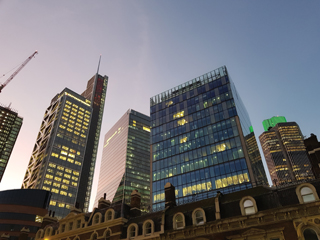What physical security trends can we expect to see in smart buildings in 2022? asks Mark Green, Physical Security Specialist at the building digitisation tech firm LMG.
From CCTV analytics and location sensors to access control, physical security technologies have long been a priority in the commercial real estate sector, and this has only been heightened by COVID-19. But while keeping buildings secure is one thing, physical security technology also has the potential to become the lynchpin of smart building infrastructures. From the shift to mobile credentials and the deployment of drones to attracting top engineering talent, here are my top predictions for the year ahead:
1.Attracting top engineering talent will continue to be a challenge
Unless more effort and investment go into creating apprenticeships or training programmes in 2022, the industry will continue to struggle from a shortage of skilled and talented engineers – and this will threaten the development of the entire sector. Talented engineers are being hoovered up by enterprise end-users who are actively recruiting from the industry and offering them huge salaries to deliver services in-house.
Therefore, as we move forward, integrators need to make more of a concerted effort to create initiatives and programmes to promote physical security education and training.
2.Mobile credentials will become increasingly popular
Shifting from physical access cards to mobile credentials will be high on the agenda for businesses eagerly anticipating a full return to the office in 2022. Replacing traditional physical cards with smartphone credentials is one of the most direct and currently available routes to widely sought-after administrative efficiencies while creating a user experience that is as frictionless as possible.
One of the most obvious benefits of mobile credentials is that they can be issued electronically en masse to visitors in advance of a visit, so they don’t have to wait for physical cards. This seamless approach maintains high levels of security at the perimeter, saves on labour, costs, and is more environmentally friendly than using physical cards.
On top of that, these access control features can be managed through an employee app that can also deliver administrative tasks including site inductions or fire procedures. Having everything on one secure app provides a superior user experience for the employee, who can treat the app as a one-stop hub for all their work-related needs.
3.Drones will be deployed to enhance physical security on campus and other large sites
The industry is constantly on the hunt for technical solutions that can augment manual labour because people are expensive and manual activity is not always fully reliable. That’s why we’ll see drones coming to the fore in 2022 to keep sites safe and secure. Facilities managers (FMs) will be deploying them to patrol site perimeters and building interiors, while also using them to respond to alarm coordinates.
Drones can be deployed to incident locations very quickly, and this speed makes them invaluable in many instances. For instance, FMs who are dealing with disaster scenarios can rely on drones to provide critical information from the scene in real time.
4. Creating a safe and secure environment will be a top priority for hospitality
Finally, delivering a superior guest experience is critical in hospitality, particularly for luxury hotels. But creating a safe and secure environment that is unobtrusive and frictionless is just as important. To achieve this, we’ll see mobile credentials being integrated with customer booking systems to provide hotel managers with real-time data and alerts – flagging any potential security threats that need immediate attention.
Smarter, more secure buildings
Every year, we look forward to seeing smart buildings continue to get smarter, and in 2022 we expect to see a continued increase in use of the data provided by security systems. The changes to our routines caused by the pandemic and the return to the workplace, when it comes, will drive plenty of physical security adaptation and innovation.










